Business Law Report: Impact of Law on Business Operations in UK
VerifiedAdded on 2021/02/20
|13
|4453
|78
Report
AI Summary
This report provides a comprehensive overview of business law in the UK, commencing with an examination of parliament sovereignty and the sources of law, including legislation, case law, and EU laws. It details the government's role in law-making, differentiating between common and statute law and their application in courts. The report then delves into the impact of contract, company, and employment law on business organizations, providing distinctions between legislation, regulations, and standards. It also explores different forms of business startups, differentiating between incorporated and unincorporated businesses, and outlines the benefits and drawbacks of companies and partnerships. The report includes two case studies that offer legal solutions to distinct business issues. In conclusion, the report assesses the effectiveness of the English legal system in light of recent developments and reforms. The report provides a solid foundation for understanding the intricacies of business law in the UK and its practical implications for business operations.
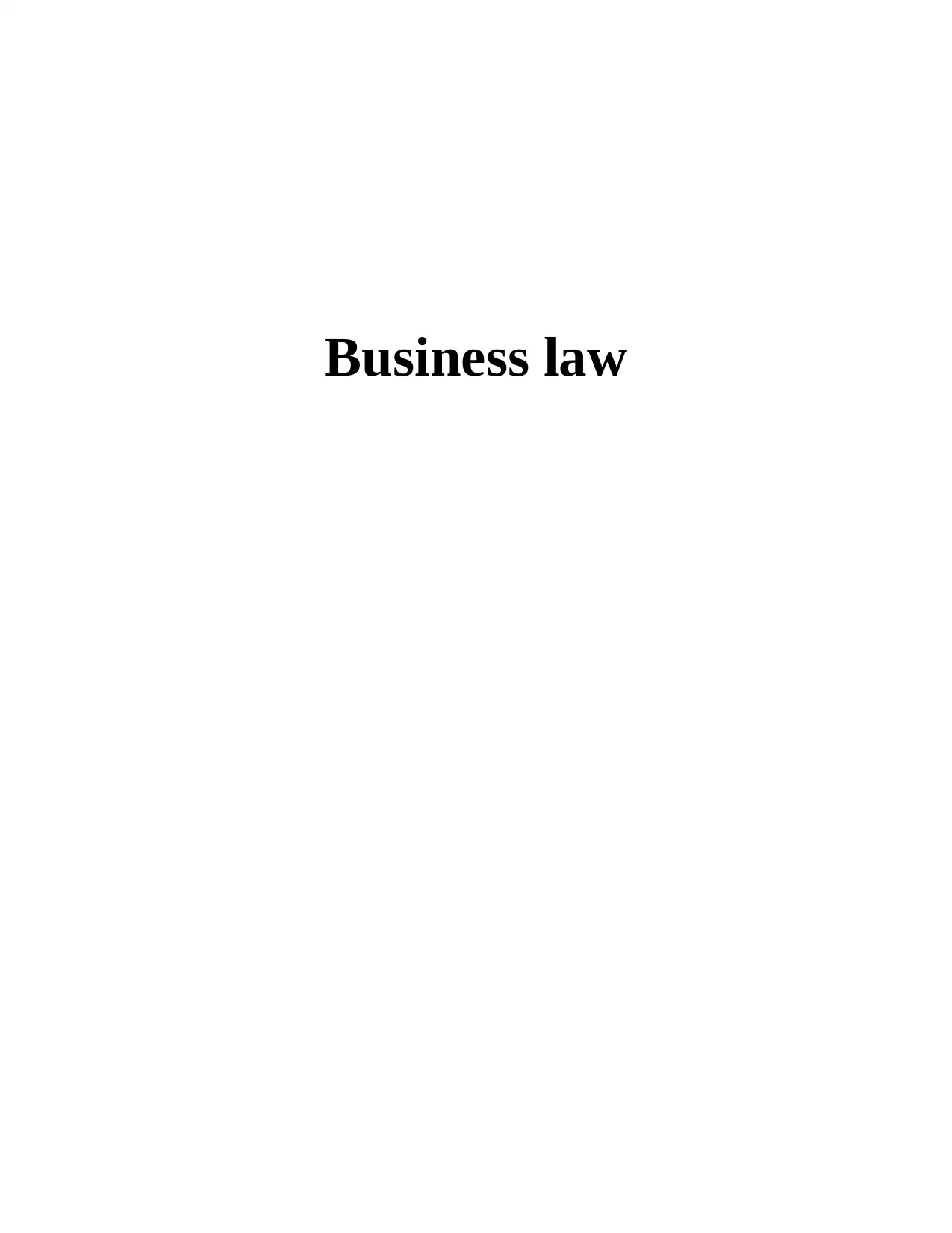
Business law
Paraphrase This Document
Need a fresh take? Get an instant paraphrase of this document with our AI Paraphraser
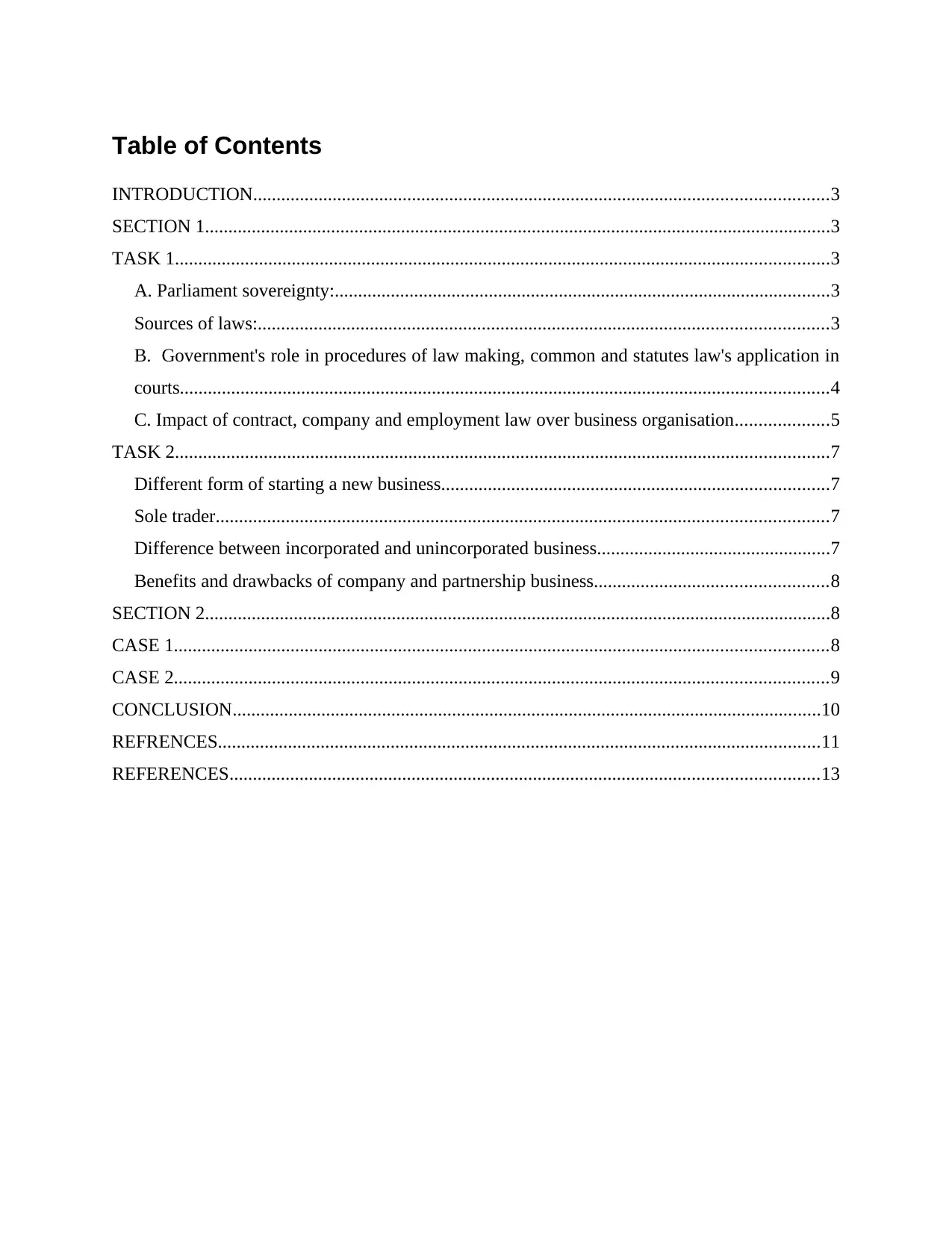
Table of Contents
INTRODUCTION...........................................................................................................................3
SECTION 1......................................................................................................................................3
TASK 1............................................................................................................................................3
A. Parliament sovereignty:..........................................................................................................3
Sources of laws:..........................................................................................................................3
B. Government's role in procedures of law making, common and statutes law's application in
courts...........................................................................................................................................4
C. Impact of contract, company and employment law over business organisation....................5
TASK 2............................................................................................................................................7
Different form of starting a new business...................................................................................7
Sole trader...................................................................................................................................7
Difference between incorporated and unincorporated business..................................................7
Benefits and drawbacks of company and partnership business..................................................8
SECTION 2......................................................................................................................................8
CASE 1............................................................................................................................................8
CASE 2............................................................................................................................................9
CONCLUSION..............................................................................................................................10
REFRENCES.................................................................................................................................11
REFERENCES..............................................................................................................................13
INTRODUCTION...........................................................................................................................3
SECTION 1......................................................................................................................................3
TASK 1............................................................................................................................................3
A. Parliament sovereignty:..........................................................................................................3
Sources of laws:..........................................................................................................................3
B. Government's role in procedures of law making, common and statutes law's application in
courts...........................................................................................................................................4
C. Impact of contract, company and employment law over business organisation....................5
TASK 2............................................................................................................................................7
Different form of starting a new business...................................................................................7
Sole trader...................................................................................................................................7
Difference between incorporated and unincorporated business..................................................7
Benefits and drawbacks of company and partnership business..................................................8
SECTION 2......................................................................................................................................8
CASE 1............................................................................................................................................8
CASE 2............................................................................................................................................9
CONCLUSION..............................................................................................................................10
REFRENCES.................................................................................................................................11
REFERENCES..............................................................................................................................13
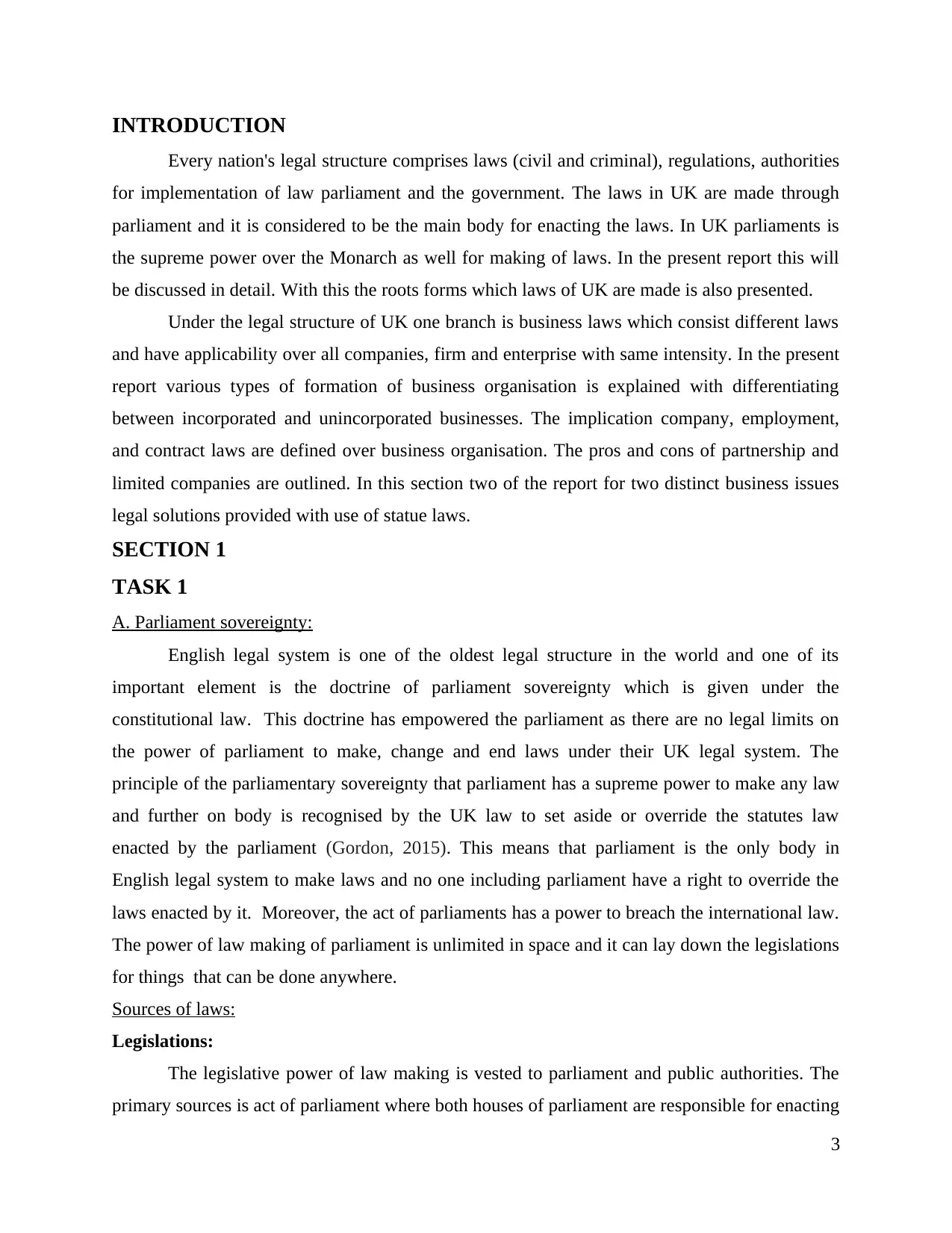
INTRODUCTION
Every nation's legal structure comprises laws (civil and criminal), regulations, authorities
for implementation of law parliament and the government. The laws in UK are made through
parliament and it is considered to be the main body for enacting the laws. In UK parliaments is
the supreme power over the Monarch as well for making of laws. In the present report this will
be discussed in detail. With this the roots forms which laws of UK are made is also presented.
Under the legal structure of UK one branch is business laws which consist different laws
and have applicability over all companies, firm and enterprise with same intensity. In the present
report various types of formation of business organisation is explained with differentiating
between incorporated and unincorporated businesses. The implication company, employment,
and contract laws are defined over business organisation. The pros and cons of partnership and
limited companies are outlined. In this section two of the report for two distinct business issues
legal solutions provided with use of statue laws.
SECTION 1
TASK 1
A. Parliament sovereignty:
English legal system is one of the oldest legal structure in the world and one of its
important element is the doctrine of parliament sovereignty which is given under the
constitutional law. This doctrine has empowered the parliament as there are no legal limits on
the power of parliament to make, change and end laws under their UK legal system. The
principle of the parliamentary sovereignty that parliament has a supreme power to make any law
and further on body is recognised by the UK law to set aside or override the statutes law
enacted by the parliament (Gordon, 2015). This means that parliament is the only body in
English legal system to make laws and no one including parliament have a right to override the
laws enacted by it. Moreover, the act of parliaments has a power to breach the international law.
The power of law making of parliament is unlimited in space and it can lay down the legislations
for things that can be done anywhere.
Sources of laws:
Legislations:
The legislative power of law making is vested to parliament and public authorities. The
primary sources is act of parliament where both houses of parliament are responsible for enacting
3
Every nation's legal structure comprises laws (civil and criminal), regulations, authorities
for implementation of law parliament and the government. The laws in UK are made through
parliament and it is considered to be the main body for enacting the laws. In UK parliaments is
the supreme power over the Monarch as well for making of laws. In the present report this will
be discussed in detail. With this the roots forms which laws of UK are made is also presented.
Under the legal structure of UK one branch is business laws which consist different laws
and have applicability over all companies, firm and enterprise with same intensity. In the present
report various types of formation of business organisation is explained with differentiating
between incorporated and unincorporated businesses. The implication company, employment,
and contract laws are defined over business organisation. The pros and cons of partnership and
limited companies are outlined. In this section two of the report for two distinct business issues
legal solutions provided with use of statue laws.
SECTION 1
TASK 1
A. Parliament sovereignty:
English legal system is one of the oldest legal structure in the world and one of its
important element is the doctrine of parliament sovereignty which is given under the
constitutional law. This doctrine has empowered the parliament as there are no legal limits on
the power of parliament to make, change and end laws under their UK legal system. The
principle of the parliamentary sovereignty that parliament has a supreme power to make any law
and further on body is recognised by the UK law to set aside or override the statutes law
enacted by the parliament (Gordon, 2015). This means that parliament is the only body in
English legal system to make laws and no one including parliament have a right to override the
laws enacted by it. Moreover, the act of parliaments has a power to breach the international law.
The power of law making of parliament is unlimited in space and it can lay down the legislations
for things that can be done anywhere.
Sources of laws:
Legislations:
The legislative power of law making is vested to parliament and public authorities. The
primary sources is act of parliament where both houses of parliament are responsible for enacting
3
⊘ This is a preview!⊘
Do you want full access?
Subscribe today to unlock all pages.

Trusted by 1+ million students worldwide
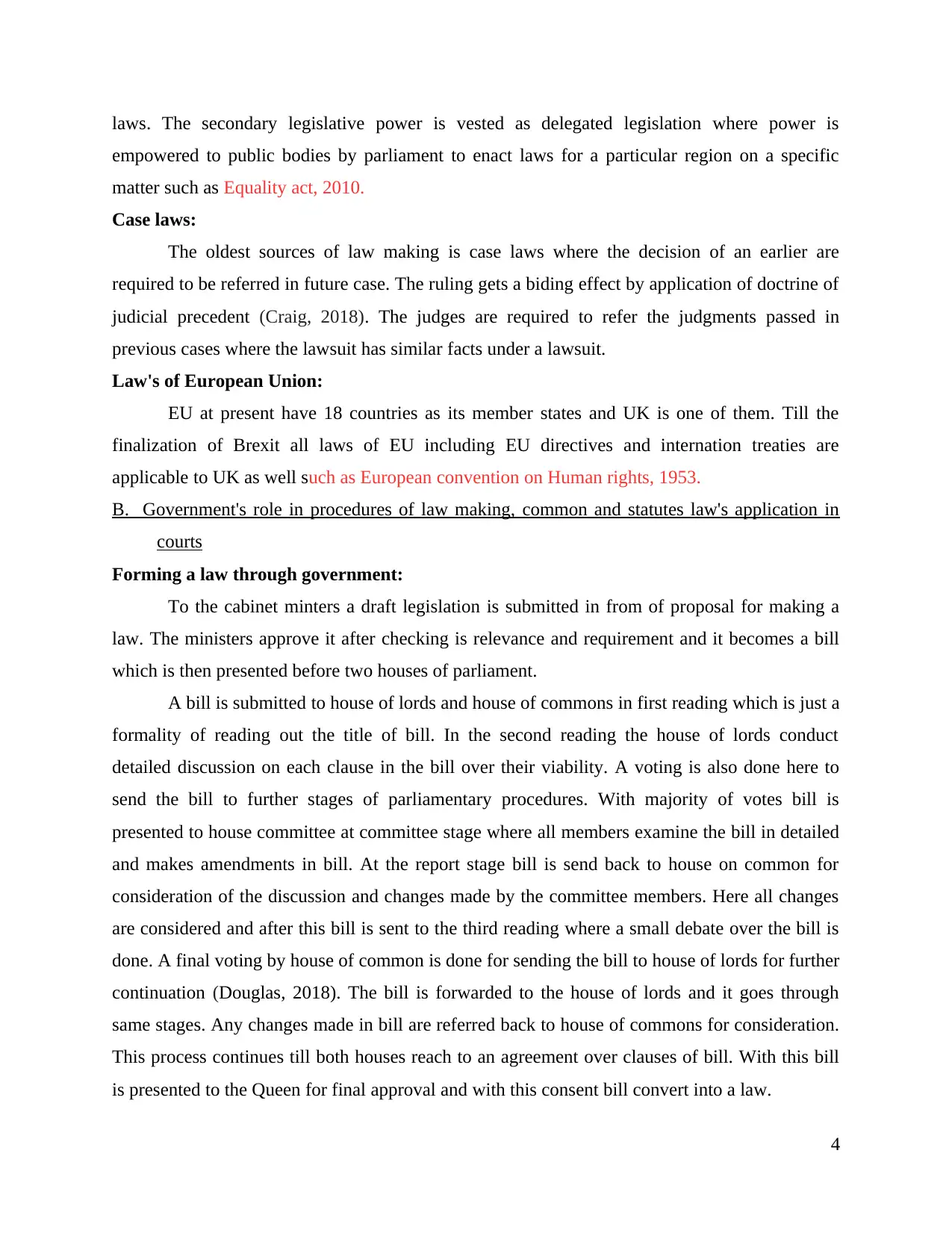
laws. The secondary legislative power is vested as delegated legislation where power is
empowered to public bodies by parliament to enact laws for a particular region on a specific
matter such as Equality act, 2010.
Case laws:
The oldest sources of law making is case laws where the decision of an earlier are
required to be referred in future case. The ruling gets a biding effect by application of doctrine of
judicial precedent (Craig, 2018). The judges are required to refer the judgments passed in
previous cases where the lawsuit has similar facts under a lawsuit.
Law's of European Union:
EU at present have 18 countries as its member states and UK is one of them. Till the
finalization of Brexit all laws of EU including EU directives and internation treaties are
applicable to UK as well such as European convention on Human rights, 1953.
B. Government's role in procedures of law making, common and statutes law's application in
courts
Forming a law through government:
To the cabinet minters a draft legislation is submitted in from of proposal for making a
law. The ministers approve it after checking is relevance and requirement and it becomes a bill
which is then presented before two houses of parliament.
A bill is submitted to house of lords and house of commons in first reading which is just a
formality of reading out the title of bill. In the second reading the house of lords conduct
detailed discussion on each clause in the bill over their viability. A voting is also done here to
send the bill to further stages of parliamentary procedures. With majority of votes bill is
presented to house committee at committee stage where all members examine the bill in detailed
and makes amendments in bill. At the report stage bill is send back to house on common for
consideration of the discussion and changes made by the committee members. Here all changes
are considered and after this bill is sent to the third reading where a small debate over the bill is
done. A final voting by house of common is done for sending the bill to house of lords for further
continuation (Douglas, 2018). The bill is forwarded to the house of lords and it goes through
same stages. Any changes made in bill are referred back to house of commons for consideration.
This process continues till both houses reach to an agreement over clauses of bill. With this bill
is presented to the Queen for final approval and with this consent bill convert into a law.
4
empowered to public bodies by parliament to enact laws for a particular region on a specific
matter such as Equality act, 2010.
Case laws:
The oldest sources of law making is case laws where the decision of an earlier are
required to be referred in future case. The ruling gets a biding effect by application of doctrine of
judicial precedent (Craig, 2018). The judges are required to refer the judgments passed in
previous cases where the lawsuit has similar facts under a lawsuit.
Law's of European Union:
EU at present have 18 countries as its member states and UK is one of them. Till the
finalization of Brexit all laws of EU including EU directives and internation treaties are
applicable to UK as well such as European convention on Human rights, 1953.
B. Government's role in procedures of law making, common and statutes law's application in
courts
Forming a law through government:
To the cabinet minters a draft legislation is submitted in from of proposal for making a
law. The ministers approve it after checking is relevance and requirement and it becomes a bill
which is then presented before two houses of parliament.
A bill is submitted to house of lords and house of commons in first reading which is just a
formality of reading out the title of bill. In the second reading the house of lords conduct
detailed discussion on each clause in the bill over their viability. A voting is also done here to
send the bill to further stages of parliamentary procedures. With majority of votes bill is
presented to house committee at committee stage where all members examine the bill in detailed
and makes amendments in bill. At the report stage bill is send back to house on common for
consideration of the discussion and changes made by the committee members. Here all changes
are considered and after this bill is sent to the third reading where a small debate over the bill is
done. A final voting by house of common is done for sending the bill to house of lords for further
continuation (Douglas, 2018). The bill is forwarded to the house of lords and it goes through
same stages. Any changes made in bill are referred back to house of commons for consideration.
This process continues till both houses reach to an agreement over clauses of bill. With this bill
is presented to the Queen for final approval and with this consent bill convert into a law.
4
Paraphrase This Document
Need a fresh take? Get an instant paraphrase of this document with our AI Paraphraser
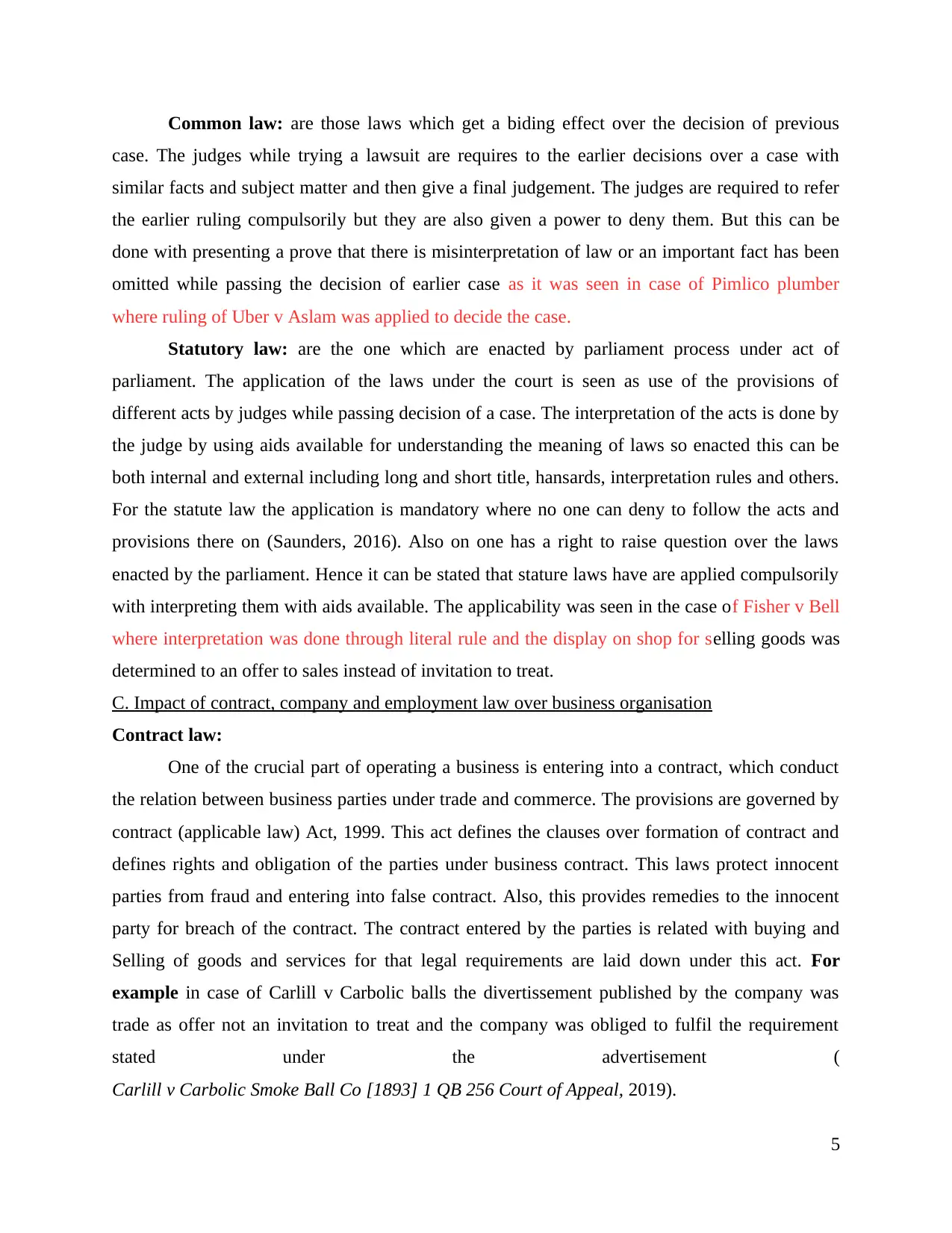
Common law: are those laws which get a biding effect over the decision of previous
case. The judges while trying a lawsuit are requires to the earlier decisions over a case with
similar facts and subject matter and then give a final judgement. The judges are required to refer
the earlier ruling compulsorily but they are also given a power to deny them. But this can be
done with presenting a prove that there is misinterpretation of law or an important fact has been
omitted while passing the decision of earlier case as it was seen in case of Pimlico plumber
where ruling of Uber v Aslam was applied to decide the case.
Statutory law: are the one which are enacted by parliament process under act of
parliament. The application of the laws under the court is seen as use of the provisions of
different acts by judges while passing decision of a case. The interpretation of the acts is done by
the judge by using aids available for understanding the meaning of laws so enacted this can be
both internal and external including long and short title, hansards, interpretation rules and others.
For the statute law the application is mandatory where no one can deny to follow the acts and
provisions there on (Saunders, 2016). Also on one has a right to raise question over the laws
enacted by the parliament. Hence it can be stated that stature laws have are applied compulsorily
with interpreting them with aids available. The applicability was seen in the case of Fisher v Bell
where interpretation was done through literal rule and the display on shop for selling goods was
determined to an offer to sales instead of invitation to treat.
C. Impact of contract, company and employment law over business organisation
Contract law:
One of the crucial part of operating a business is entering into a contract, which conduct
the relation between business parties under trade and commerce. The provisions are governed by
contract (applicable law) Act, 1999. This act defines the clauses over formation of contract and
defines rights and obligation of the parties under business contract. This laws protect innocent
parties from fraud and entering into false contract. Also, this provides remedies to the innocent
party for breach of the contract. The contract entered by the parties is related with buying and
Selling of goods and services for that legal requirements are laid down under this act. For
example in case of Carlill v Carbolic balls the divertissement published by the company was
trade as offer not an invitation to treat and the company was obliged to fulfil the requirement
stated under the advertisement (
Carlill v Carbolic Smoke Ball Co [1893] 1 QB 256 Court of Appeal, 2019).
5
case. The judges while trying a lawsuit are requires to the earlier decisions over a case with
similar facts and subject matter and then give a final judgement. The judges are required to refer
the earlier ruling compulsorily but they are also given a power to deny them. But this can be
done with presenting a prove that there is misinterpretation of law or an important fact has been
omitted while passing the decision of earlier case as it was seen in case of Pimlico plumber
where ruling of Uber v Aslam was applied to decide the case.
Statutory law: are the one which are enacted by parliament process under act of
parliament. The application of the laws under the court is seen as use of the provisions of
different acts by judges while passing decision of a case. The interpretation of the acts is done by
the judge by using aids available for understanding the meaning of laws so enacted this can be
both internal and external including long and short title, hansards, interpretation rules and others.
For the statute law the application is mandatory where no one can deny to follow the acts and
provisions there on (Saunders, 2016). Also on one has a right to raise question over the laws
enacted by the parliament. Hence it can be stated that stature laws have are applied compulsorily
with interpreting them with aids available. The applicability was seen in the case of Fisher v Bell
where interpretation was done through literal rule and the display on shop for selling goods was
determined to an offer to sales instead of invitation to treat.
C. Impact of contract, company and employment law over business organisation
Contract law:
One of the crucial part of operating a business is entering into a contract, which conduct
the relation between business parties under trade and commerce. The provisions are governed by
contract (applicable law) Act, 1999. This act defines the clauses over formation of contract and
defines rights and obligation of the parties under business contract. This laws protect innocent
parties from fraud and entering into false contract. Also, this provides remedies to the innocent
party for breach of the contract. The contract entered by the parties is related with buying and
Selling of goods and services for that legal requirements are laid down under this act. For
example in case of Carlill v Carbolic balls the divertissement published by the company was
trade as offer not an invitation to treat and the company was obliged to fulfil the requirement
stated under the advertisement (
Carlill v Carbolic Smoke Ball Co [1893] 1 QB 256 Court of Appeal, 2019).
5
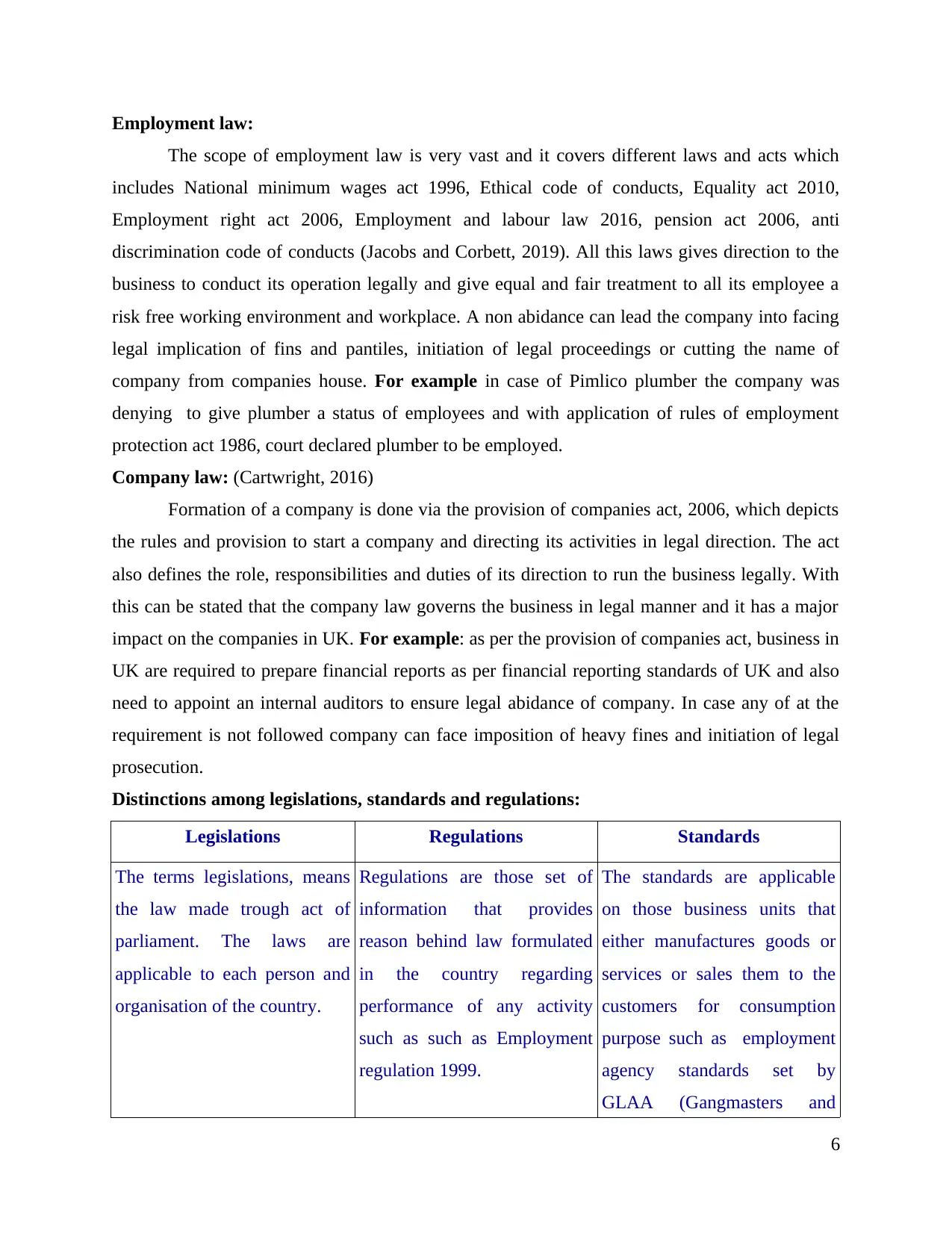
Employment law:
The scope of employment law is very vast and it covers different laws and acts which
includes National minimum wages act 1996, Ethical code of conducts, Equality act 2010,
Employment right act 2006, Employment and labour law 2016, pension act 2006, anti
discrimination code of conducts (Jacobs and Corbett, 2019). All this laws gives direction to the
business to conduct its operation legally and give equal and fair treatment to all its employee a
risk free working environment and workplace. A non abidance can lead the company into facing
legal implication of fins and pantiles, initiation of legal proceedings or cutting the name of
company from companies house. For example in case of Pimlico plumber the company was
denying to give plumber a status of employees and with application of rules of employment
protection act 1986, court declared plumber to be employed.
Company law: (Cartwright, 2016)
Formation of a company is done via the provision of companies act, 2006, which depicts
the rules and provision to start a company and directing its activities in legal direction. The act
also defines the role, responsibilities and duties of its direction to run the business legally. With
this can be stated that the company law governs the business in legal manner and it has a major
impact on the companies in UK. For example: as per the provision of companies act, business in
UK are required to prepare financial reports as per financial reporting standards of UK and also
need to appoint an internal auditors to ensure legal abidance of company. In case any of at the
requirement is not followed company can face imposition of heavy fines and initiation of legal
prosecution.
Distinctions among legislations, standards and regulations:
Legislations Regulations Standards
The terms legislations, means
the law made trough act of
parliament. The laws are
applicable to each person and
organisation of the country.
Regulations are those set of
information that provides
reason behind law formulated
in the country regarding
performance of any activity
such as such as Employment
regulation 1999.
The standards are applicable
on those business units that
either manufactures goods or
services or sales them to the
customers for consumption
purpose such as employment
agency standards set by
GLAA (Gangmasters and
6
The scope of employment law is very vast and it covers different laws and acts which
includes National minimum wages act 1996, Ethical code of conducts, Equality act 2010,
Employment right act 2006, Employment and labour law 2016, pension act 2006, anti
discrimination code of conducts (Jacobs and Corbett, 2019). All this laws gives direction to the
business to conduct its operation legally and give equal and fair treatment to all its employee a
risk free working environment and workplace. A non abidance can lead the company into facing
legal implication of fins and pantiles, initiation of legal proceedings or cutting the name of
company from companies house. For example in case of Pimlico plumber the company was
denying to give plumber a status of employees and with application of rules of employment
protection act 1986, court declared plumber to be employed.
Company law: (Cartwright, 2016)
Formation of a company is done via the provision of companies act, 2006, which depicts
the rules and provision to start a company and directing its activities in legal direction. The act
also defines the role, responsibilities and duties of its direction to run the business legally. With
this can be stated that the company law governs the business in legal manner and it has a major
impact on the companies in UK. For example: as per the provision of companies act, business in
UK are required to prepare financial reports as per financial reporting standards of UK and also
need to appoint an internal auditors to ensure legal abidance of company. In case any of at the
requirement is not followed company can face imposition of heavy fines and initiation of legal
prosecution.
Distinctions among legislations, standards and regulations:
Legislations Regulations Standards
The terms legislations, means
the law made trough act of
parliament. The laws are
applicable to each person and
organisation of the country.
Regulations are those set of
information that provides
reason behind law formulated
in the country regarding
performance of any activity
such as such as Employment
regulation 1999.
The standards are applicable
on those business units that
either manufactures goods or
services or sales them to the
customers for consumption
purpose such as employment
agency standards set by
GLAA (Gangmasters and
6
⊘ This is a preview!⊘
Do you want full access?
Subscribe today to unlock all pages.

Trusted by 1+ million students worldwide
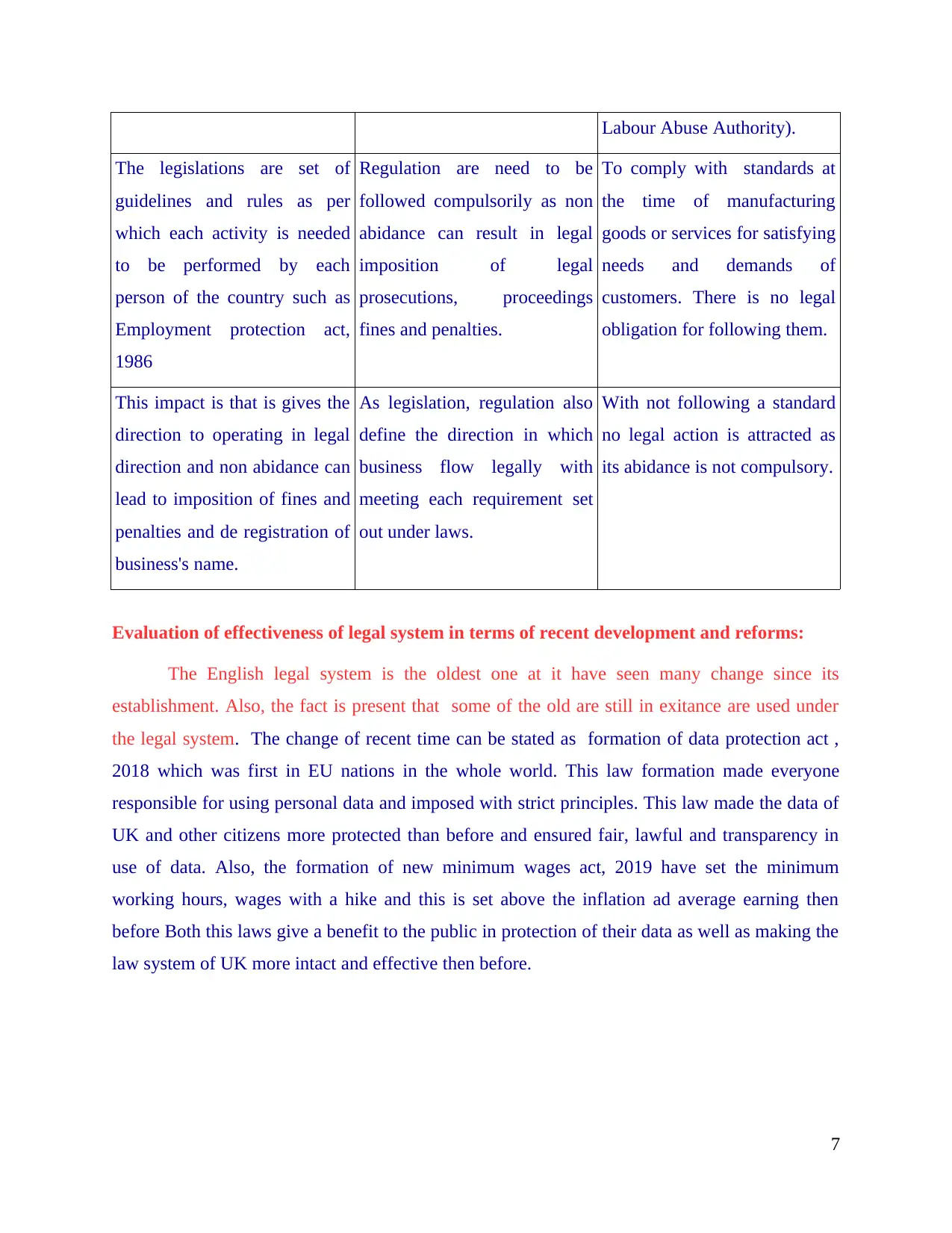
Labour Abuse Authority).
The legislations are set of
guidelines and rules as per
which each activity is needed
to be performed by each
person of the country such as
Employment protection act,
1986
Regulation are need to be
followed compulsorily as non
abidance can result in legal
imposition of legal
prosecutions, proceedings
fines and penalties.
To comply with standards at
the time of manufacturing
goods or services for satisfying
needs and demands of
customers. There is no legal
obligation for following them.
This impact is that is gives the
direction to operating in legal
direction and non abidance can
lead to imposition of fines and
penalties and de registration of
business's name.
As legislation, regulation also
define the direction in which
business flow legally with
meeting each requirement set
out under laws.
With not following a standard
no legal action is attracted as
its abidance is not compulsory.
Evaluation of effectiveness of legal system in terms of recent development and reforms:
The English legal system is the oldest one at it have seen many change since its
establishment. Also, the fact is present that some of the old are still in exitance are used under
the legal system. The change of recent time can be stated as formation of data protection act ,
2018 which was first in EU nations in the whole world. This law formation made everyone
responsible for using personal data and imposed with strict principles. This law made the data of
UK and other citizens more protected than before and ensured fair, lawful and transparency in
use of data. Also, the formation of new minimum wages act, 2019 have set the minimum
working hours, wages with a hike and this is set above the inflation ad average earning then
before Both this laws give a benefit to the public in protection of their data as well as making the
law system of UK more intact and effective then before.
7
The legislations are set of
guidelines and rules as per
which each activity is needed
to be performed by each
person of the country such as
Employment protection act,
1986
Regulation are need to be
followed compulsorily as non
abidance can result in legal
imposition of legal
prosecutions, proceedings
fines and penalties.
To comply with standards at
the time of manufacturing
goods or services for satisfying
needs and demands of
customers. There is no legal
obligation for following them.
This impact is that is gives the
direction to operating in legal
direction and non abidance can
lead to imposition of fines and
penalties and de registration of
business's name.
As legislation, regulation also
define the direction in which
business flow legally with
meeting each requirement set
out under laws.
With not following a standard
no legal action is attracted as
its abidance is not compulsory.
Evaluation of effectiveness of legal system in terms of recent development and reforms:
The English legal system is the oldest one at it have seen many change since its
establishment. Also, the fact is present that some of the old are still in exitance are used under
the legal system. The change of recent time can be stated as formation of data protection act ,
2018 which was first in EU nations in the whole world. This law formation made everyone
responsible for using personal data and imposed with strict principles. This law made the data of
UK and other citizens more protected than before and ensured fair, lawful and transparency in
use of data. Also, the formation of new minimum wages act, 2019 have set the minimum
working hours, wages with a hike and this is set above the inflation ad average earning then
before Both this laws give a benefit to the public in protection of their data as well as making the
law system of UK more intact and effective then before.
7
Paraphrase This Document
Need a fresh take? Get an instant paraphrase of this document with our AI Paraphraser
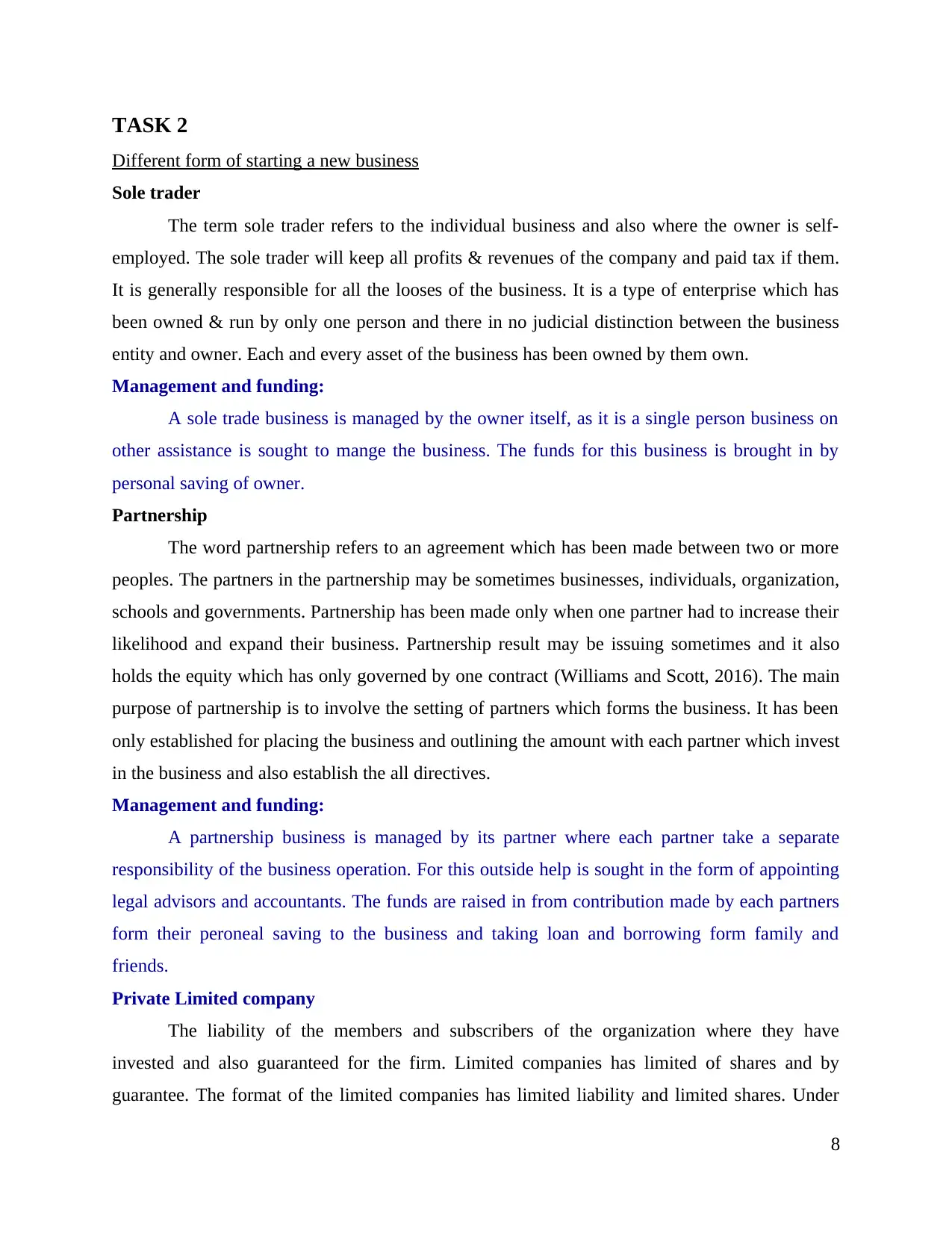
TASK 2
Different form of starting a new business
Sole trader
The term sole trader refers to the individual business and also where the owner is self-
employed. The sole trader will keep all profits & revenues of the company and paid tax if them.
It is generally responsible for all the looses of the business. It is a type of enterprise which has
been owned & run by only one person and there in no judicial distinction between the business
entity and owner. Each and every asset of the business has been owned by them own.
Management and funding:
A sole trade business is managed by the owner itself, as it is a single person business on
other assistance is sought to mange the business. The funds for this business is brought in by
personal saving of owner.
Partnership
The word partnership refers to an agreement which has been made between two or more
peoples. The partners in the partnership may be sometimes businesses, individuals, organization,
schools and governments. Partnership has been made only when one partner had to increase their
likelihood and expand their business. Partnership result may be issuing sometimes and it also
holds the equity which has only governed by one contract (Williams and Scott, 2016). The main
purpose of partnership is to involve the setting of partners which forms the business. It has been
only established for placing the business and outlining the amount with each partner which invest
in the business and also establish the all directives.
Management and funding:
A partnership business is managed by its partner where each partner take a separate
responsibility of the business operation. For this outside help is sought in the form of appointing
legal advisors and accountants. The funds are raised in from contribution made by each partners
form their peroneal saving to the business and taking loan and borrowing form family and
friends.
Private Limited company
The liability of the members and subscribers of the organization where they have
invested and also guaranteed for the firm. Limited companies has limited of shares and by
guarantee. The format of the limited companies has limited liability and limited shares. Under
8
Different form of starting a new business
Sole trader
The term sole trader refers to the individual business and also where the owner is self-
employed. The sole trader will keep all profits & revenues of the company and paid tax if them.
It is generally responsible for all the looses of the business. It is a type of enterprise which has
been owned & run by only one person and there in no judicial distinction between the business
entity and owner. Each and every asset of the business has been owned by them own.
Management and funding:
A sole trade business is managed by the owner itself, as it is a single person business on
other assistance is sought to mange the business. The funds for this business is brought in by
personal saving of owner.
Partnership
The word partnership refers to an agreement which has been made between two or more
peoples. The partners in the partnership may be sometimes businesses, individuals, organization,
schools and governments. Partnership has been made only when one partner had to increase their
likelihood and expand their business. Partnership result may be issuing sometimes and it also
holds the equity which has only governed by one contract (Williams and Scott, 2016). The main
purpose of partnership is to involve the setting of partners which forms the business. It has been
only established for placing the business and outlining the amount with each partner which invest
in the business and also establish the all directives.
Management and funding:
A partnership business is managed by its partner where each partner take a separate
responsibility of the business operation. For this outside help is sought in the form of appointing
legal advisors and accountants. The funds are raised in from contribution made by each partners
form their peroneal saving to the business and taking loan and borrowing form family and
friends.
Private Limited company
The liability of the members and subscribers of the organization where they have
invested and also guaranteed for the firm. Limited companies has limited of shares and by
guarantee. The format of the limited companies has limited liability and limited shares. Under
8
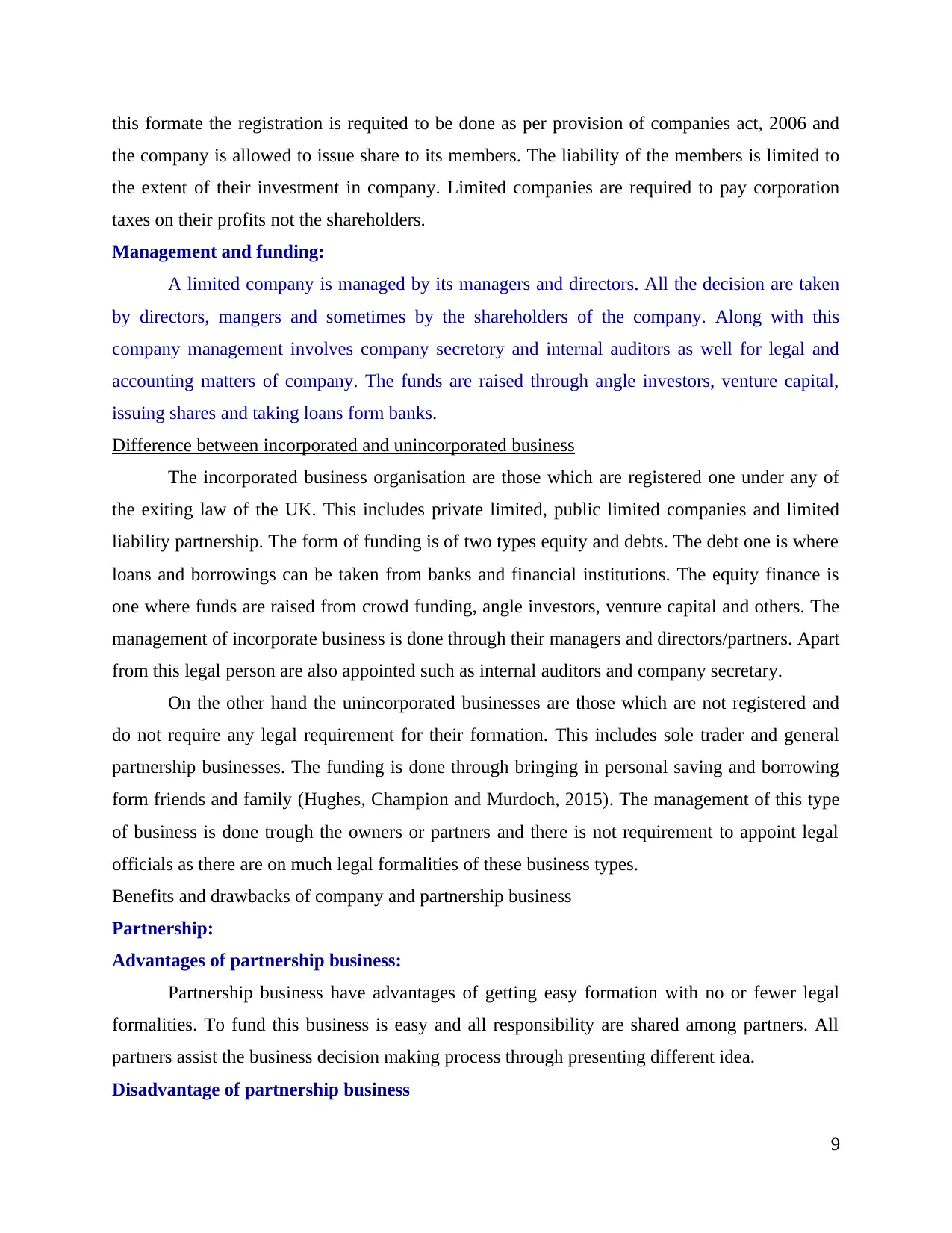
this formate the registration is requited to be done as per provision of companies act, 2006 and
the company is allowed to issue share to its members. The liability of the members is limited to
the extent of their investment in company. Limited companies are required to pay corporation
taxes on their profits not the shareholders.
Management and funding:
A limited company is managed by its managers and directors. All the decision are taken
by directors, mangers and sometimes by the shareholders of the company. Along with this
company management involves company secretory and internal auditors as well for legal and
accounting matters of company. The funds are raised through angle investors, venture capital,
issuing shares and taking loans form banks.
Difference between incorporated and unincorporated business
The incorporated business organisation are those which are registered one under any of
the exiting law of the UK. This includes private limited, public limited companies and limited
liability partnership. The form of funding is of two types equity and debts. The debt one is where
loans and borrowings can be taken from banks and financial institutions. The equity finance is
one where funds are raised from crowd funding, angle investors, venture capital and others. The
management of incorporate business is done through their managers and directors/partners. Apart
from this legal person are also appointed such as internal auditors and company secretary.
On the other hand the unincorporated businesses are those which are not registered and
do not require any legal requirement for their formation. This includes sole trader and general
partnership businesses. The funding is done through bringing in personal saving and borrowing
form friends and family (Hughes, Champion and Murdoch, 2015). The management of this type
of business is done trough the owners or partners and there is not requirement to appoint legal
officials as there are on much legal formalities of these business types.
Benefits and drawbacks of company and partnership business
Partnership:
Advantages of partnership business:
Partnership business have advantages of getting easy formation with no or fewer legal
formalities. To fund this business is easy and all responsibility are shared among partners. All
partners assist the business decision making process through presenting different idea.
Disadvantage of partnership business
9
the company is allowed to issue share to its members. The liability of the members is limited to
the extent of their investment in company. Limited companies are required to pay corporation
taxes on their profits not the shareholders.
Management and funding:
A limited company is managed by its managers and directors. All the decision are taken
by directors, mangers and sometimes by the shareholders of the company. Along with this
company management involves company secretory and internal auditors as well for legal and
accounting matters of company. The funds are raised through angle investors, venture capital,
issuing shares and taking loans form banks.
Difference between incorporated and unincorporated business
The incorporated business organisation are those which are registered one under any of
the exiting law of the UK. This includes private limited, public limited companies and limited
liability partnership. The form of funding is of two types equity and debts. The debt one is where
loans and borrowings can be taken from banks and financial institutions. The equity finance is
one where funds are raised from crowd funding, angle investors, venture capital and others. The
management of incorporate business is done through their managers and directors/partners. Apart
from this legal person are also appointed such as internal auditors and company secretary.
On the other hand the unincorporated businesses are those which are not registered and
do not require any legal requirement for their formation. This includes sole trader and general
partnership businesses. The funding is done through bringing in personal saving and borrowing
form friends and family (Hughes, Champion and Murdoch, 2015). The management of this type
of business is done trough the owners or partners and there is not requirement to appoint legal
officials as there are on much legal formalities of these business types.
Benefits and drawbacks of company and partnership business
Partnership:
Advantages of partnership business:
Partnership business have advantages of getting easy formation with no or fewer legal
formalities. To fund this business is easy and all responsibility are shared among partners. All
partners assist the business decision making process through presenting different idea.
Disadvantage of partnership business
9
⊘ This is a preview!⊘
Do you want full access?
Subscribe today to unlock all pages.

Trusted by 1+ million students worldwide
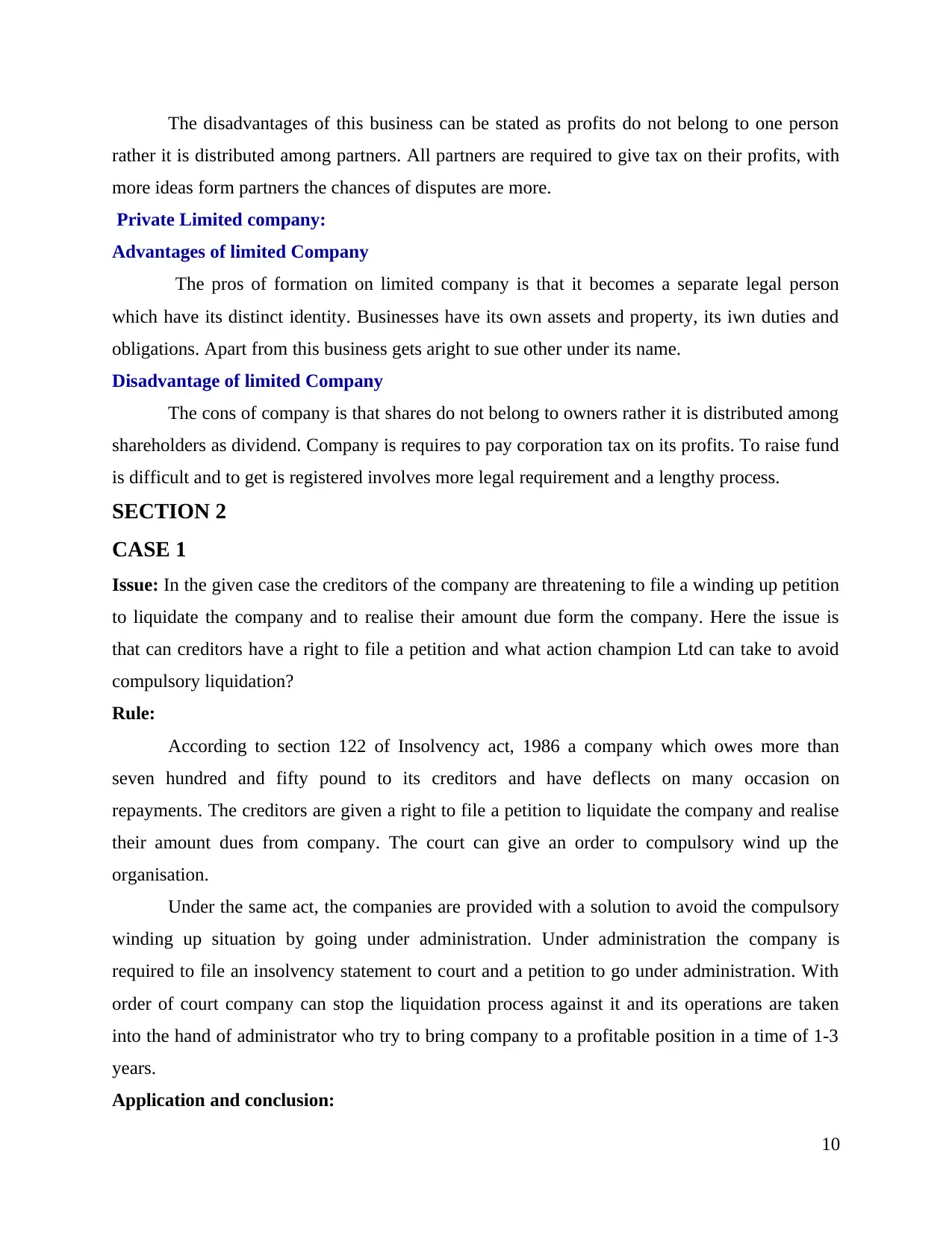
The disadvantages of this business can be stated as profits do not belong to one person
rather it is distributed among partners. All partners are required to give tax on their profits, with
more ideas form partners the chances of disputes are more.
Private Limited company:
Advantages of limited Company
The pros of formation on limited company is that it becomes a separate legal person
which have its distinct identity. Businesses have its own assets and property, its iwn duties and
obligations. Apart from this business gets aright to sue other under its name.
Disadvantage of limited Company
The cons of company is that shares do not belong to owners rather it is distributed among
shareholders as dividend. Company is requires to pay corporation tax on its profits. To raise fund
is difficult and to get is registered involves more legal requirement and a lengthy process.
SECTION 2
CASE 1
Issue: In the given case the creditors of the company are threatening to file a winding up petition
to liquidate the company and to realise their amount due form the company. Here the issue is
that can creditors have a right to file a petition and what action champion Ltd can take to avoid
compulsory liquidation?
Rule:
According to section 122 of Insolvency act, 1986 a company which owes more than
seven hundred and fifty pound to its creditors and have deflects on many occasion on
repayments. The creditors are given a right to file a petition to liquidate the company and realise
their amount dues from company. The court can give an order to compulsory wind up the
organisation.
Under the same act, the companies are provided with a solution to avoid the compulsory
winding up situation by going under administration. Under administration the company is
required to file an insolvency statement to court and a petition to go under administration. With
order of court company can stop the liquidation process against it and its operations are taken
into the hand of administrator who try to bring company to a profitable position in a time of 1-3
years.
Application and conclusion:
10
rather it is distributed among partners. All partners are required to give tax on their profits, with
more ideas form partners the chances of disputes are more.
Private Limited company:
Advantages of limited Company
The pros of formation on limited company is that it becomes a separate legal person
which have its distinct identity. Businesses have its own assets and property, its iwn duties and
obligations. Apart from this business gets aright to sue other under its name.
Disadvantage of limited Company
The cons of company is that shares do not belong to owners rather it is distributed among
shareholders as dividend. Company is requires to pay corporation tax on its profits. To raise fund
is difficult and to get is registered involves more legal requirement and a lengthy process.
SECTION 2
CASE 1
Issue: In the given case the creditors of the company are threatening to file a winding up petition
to liquidate the company and to realise their amount due form the company. Here the issue is
that can creditors have a right to file a petition and what action champion Ltd can take to avoid
compulsory liquidation?
Rule:
According to section 122 of Insolvency act, 1986 a company which owes more than
seven hundred and fifty pound to its creditors and have deflects on many occasion on
repayments. The creditors are given a right to file a petition to liquidate the company and realise
their amount dues from company. The court can give an order to compulsory wind up the
organisation.
Under the same act, the companies are provided with a solution to avoid the compulsory
winding up situation by going under administration. Under administration the company is
required to file an insolvency statement to court and a petition to go under administration. With
order of court company can stop the liquidation process against it and its operations are taken
into the hand of administrator who try to bring company to a profitable position in a time of 1-3
years.
Application and conclusion:
10
Paraphrase This Document
Need a fresh take? Get an instant paraphrase of this document with our AI Paraphraser
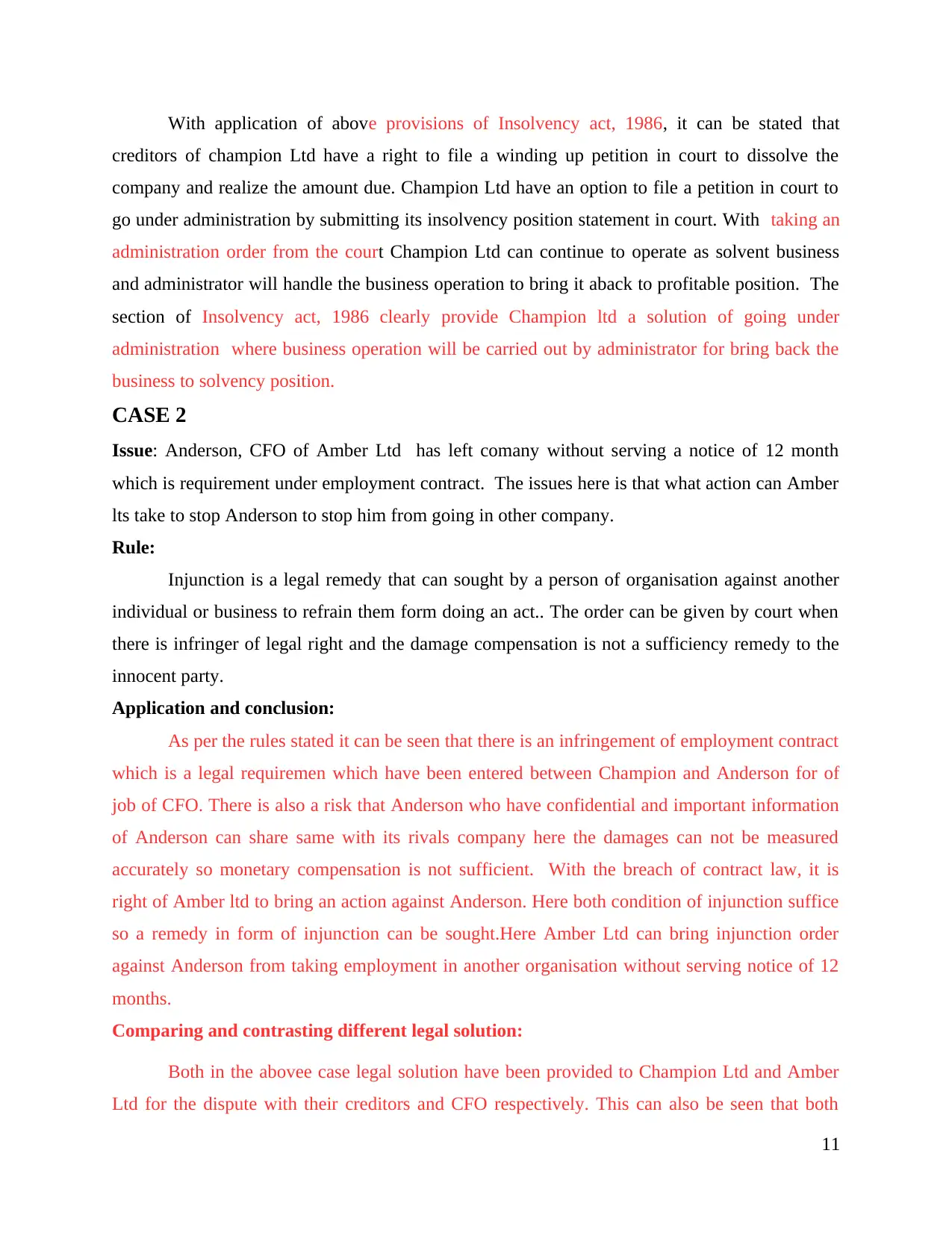
With application of above provisions of Insolvency act, 1986, it can be stated that
creditors of champion Ltd have a right to file a winding up petition in court to dissolve the
company and realize the amount due. Champion Ltd have an option to file a petition in court to
go under administration by submitting its insolvency position statement in court. With taking an
administration order from the court Champion Ltd can continue to operate as solvent business
and administrator will handle the business operation to bring it aback to profitable position. The
section of Insolvency act, 1986 clearly provide Champion ltd a solution of going under
administration where business operation will be carried out by administrator for bring back the
business to solvency position.
CASE 2
Issue: Anderson, CFO of Amber Ltd has left comany without serving a notice of 12 month
which is requirement under employment contract. The issues here is that what action can Amber
lts take to stop Anderson to stop him from going in other company.
Rule:
Injunction is a legal remedy that can sought by a person of organisation against another
individual or business to refrain them form doing an act.. The order can be given by court when
there is infringer of legal right and the damage compensation is not a sufficiency remedy to the
innocent party.
Application and conclusion:
As per the rules stated it can be seen that there is an infringement of employment contract
which is a legal requiremen which have been entered between Champion and Anderson for of
job of CFO. There is also a risk that Anderson who have confidential and important information
of Anderson can share same with its rivals company here the damages can not be measured
accurately so monetary compensation is not sufficient. With the breach of contract law, it is
right of Amber ltd to bring an action against Anderson. Here both condition of injunction suffice
so a remedy in form of injunction can be sought.Here Amber Ltd can bring injunction order
against Anderson from taking employment in another organisation without serving notice of 12
months.
Comparing and contrasting different legal solution:
Both in the abovee case legal solution have been provided to Champion Ltd and Amber
Ltd for the dispute with their creditors and CFO respectively. This can also be seen that both
11
creditors of champion Ltd have a right to file a winding up petition in court to dissolve the
company and realize the amount due. Champion Ltd have an option to file a petition in court to
go under administration by submitting its insolvency position statement in court. With taking an
administration order from the court Champion Ltd can continue to operate as solvent business
and administrator will handle the business operation to bring it aback to profitable position. The
section of Insolvency act, 1986 clearly provide Champion ltd a solution of going under
administration where business operation will be carried out by administrator for bring back the
business to solvency position.
CASE 2
Issue: Anderson, CFO of Amber Ltd has left comany without serving a notice of 12 month
which is requirement under employment contract. The issues here is that what action can Amber
lts take to stop Anderson to stop him from going in other company.
Rule:
Injunction is a legal remedy that can sought by a person of organisation against another
individual or business to refrain them form doing an act.. The order can be given by court when
there is infringer of legal right and the damage compensation is not a sufficiency remedy to the
innocent party.
Application and conclusion:
As per the rules stated it can be seen that there is an infringement of employment contract
which is a legal requiremen which have been entered between Champion and Anderson for of
job of CFO. There is also a risk that Anderson who have confidential and important information
of Anderson can share same with its rivals company here the damages can not be measured
accurately so monetary compensation is not sufficient. With the breach of contract law, it is
right of Amber ltd to bring an action against Anderson. Here both condition of injunction suffice
so a remedy in form of injunction can be sought.Here Amber Ltd can bring injunction order
against Anderson from taking employment in another organisation without serving notice of 12
months.
Comparing and contrasting different legal solution:
Both in the abovee case legal solution have been provided to Champion Ltd and Amber
Ltd for the dispute with their creditors and CFO respectively. This can also be seen that both
11
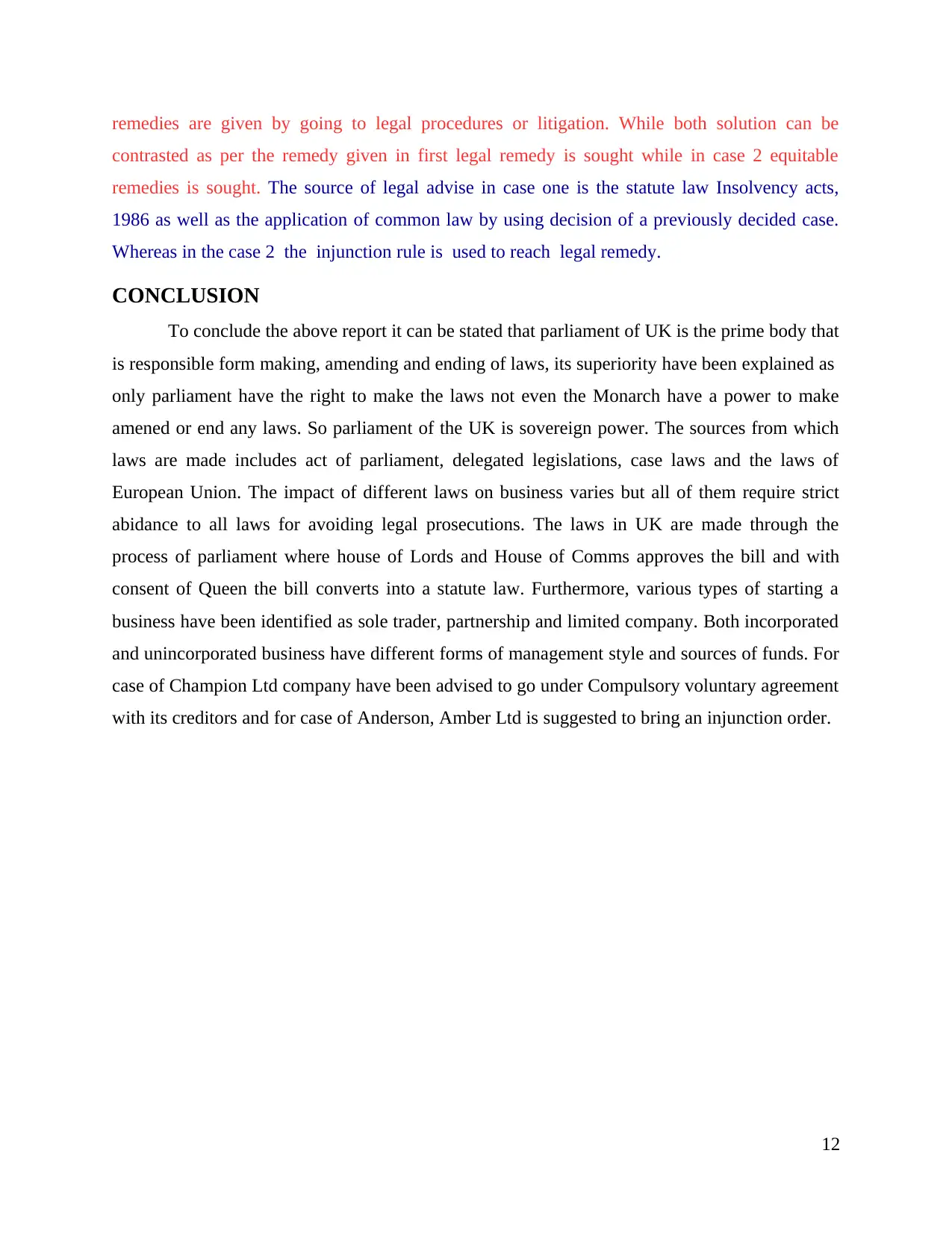
remedies are given by going to legal procedures or litigation. While both solution can be
contrasted as per the remedy given in first legal remedy is sought while in case 2 equitable
remedies is sought. The source of legal advise in case one is the statute law Insolvency acts,
1986 as well as the application of common law by using decision of a previously decided case.
Whereas in the case 2 the injunction rule is used to reach legal remedy.
CONCLUSION
To conclude the above report it can be stated that parliament of UK is the prime body that
is responsible form making, amending and ending of laws, its superiority have been explained as
only parliament have the right to make the laws not even the Monarch have a power to make
amened or end any laws. So parliament of the UK is sovereign power. The sources from which
laws are made includes act of parliament, delegated legislations, case laws and the laws of
European Union. The impact of different laws on business varies but all of them require strict
abidance to all laws for avoiding legal prosecutions. The laws in UK are made through the
process of parliament where house of Lords and House of Comms approves the bill and with
consent of Queen the bill converts into a statute law. Furthermore, various types of starting a
business have been identified as sole trader, partnership and limited company. Both incorporated
and unincorporated business have different forms of management style and sources of funds. For
case of Champion Ltd company have been advised to go under Compulsory voluntary agreement
with its creditors and for case of Anderson, Amber Ltd is suggested to bring an injunction order.
12
contrasted as per the remedy given in first legal remedy is sought while in case 2 equitable
remedies is sought. The source of legal advise in case one is the statute law Insolvency acts,
1986 as well as the application of common law by using decision of a previously decided case.
Whereas in the case 2 the injunction rule is used to reach legal remedy.
CONCLUSION
To conclude the above report it can be stated that parliament of UK is the prime body that
is responsible form making, amending and ending of laws, its superiority have been explained as
only parliament have the right to make the laws not even the Monarch have a power to make
amened or end any laws. So parliament of the UK is sovereign power. The sources from which
laws are made includes act of parliament, delegated legislations, case laws and the laws of
European Union. The impact of different laws on business varies but all of them require strict
abidance to all laws for avoiding legal prosecutions. The laws in UK are made through the
process of parliament where house of Lords and House of Comms approves the bill and with
consent of Queen the bill converts into a statute law. Furthermore, various types of starting a
business have been identified as sole trader, partnership and limited company. Both incorporated
and unincorporated business have different forms of management style and sources of funds. For
case of Champion Ltd company have been advised to go under Compulsory voluntary agreement
with its creditors and for case of Anderson, Amber Ltd is suggested to bring an injunction order.
12
⊘ This is a preview!⊘
Do you want full access?
Subscribe today to unlock all pages.

Trusted by 1+ million students worldwide
1 out of 13
Related Documents
Your All-in-One AI-Powered Toolkit for Academic Success.
+13062052269
info@desklib.com
Available 24*7 on WhatsApp / Email
![[object Object]](/_next/static/media/star-bottom.7253800d.svg)
Unlock your academic potential
Copyright © 2020–2026 A2Z Services. All Rights Reserved. Developed and managed by ZUCOL.



